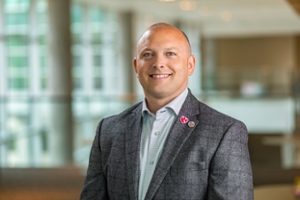The last course in the summer Innovation Corps program for the National Institutes of Health (NIH) began at the end. Edmund Pendleton, a director of the DC I-Corps program started with Q&A. The somewhat shellshocked, 76 bleary-eyed professionals stared back, perfectly questionless on the weekly Zoom so I unmuted my app and asked: “Who, in your experience, really appreciates the I-Corps program and all the work we’ve just done? Where can I use my status as an I-Corps graduate to be credible?”
His answer surprised me.
~~~
I-Corps is intense. Team Breezmed racked up 102 interviews in nine weeks with another two dozen pending—psychiatric prescribers from across the nation as well as a smattering of rheumatologists, pain doctors, physician executives, nurse practitioners, policy wonks, and insurance policy administrators. From those interviews Team Breezmed discovered so much about their customers: from the stunning diversity of computer systems used in healthcare providers’ offices to the surprisingly complex burden of work that prior authorizations create.
 As part of Breezmed’s STTR the NIH invited Dr. Steve Salzbrenner to participate in the I-Corps program to better understand what kind of product best fits the most addressable market. Dr. Salzbrenner asked me to participate in the program and I almost immediately regretted it. I-Corps requires four hours a week of class time, hours of prospecting, scheduling, and conducting interviews and long nights assembling findings into PowerPoint presentations.
As part of Breezmed’s STTR the NIH invited Dr. Steve Salzbrenner to participate in the I-Corps program to better understand what kind of product best fits the most addressable market. Dr. Salzbrenner asked me to participate in the program and I almost immediately regretted it. I-Corps requires four hours a week of class time, hours of prospecting, scheduling, and conducting interviews and long nights assembling findings into PowerPoint presentations.
Rounding out Team Breezmed is Shawntea Moheiser, a healthcare policy wonk, author, and podcaster who served as the public face of our team. Taya, sitting behind her professional recording kit, wrestled with our horrifyingly expert faculty and their ruthlessly on-point questions.
The I-Corps program focused Breezmed on its initial customers. The team closed a lot of doors, made a plan and did it all using the words of the people that might actually be customers. A few asked us to follow up as soon as we have something they could buy. My initial resentment over the amount of work faded into grudging gratitude – the program really helped us all better understand how great research could become a valuable product. Over the weeks a research project slowly becomes a product that people would really want to buy.
~~~
“You’re not a graduate yet,” Pendleton reminded me with a sideways smile, but acknowledged the question. He recounted how past I-Corps graduates went on to get generous grants or serious investments. They didn’t do it on the reputation of a program; they did it with the evidence they collected. Pendleton addressed the whole cohort. “Let the evidence be your guide.”
In that moment I finally got it. I-Corps rightfully deserves its reputation for hard work. I had thought the reputation made is why I was doing the work, but I’d had it exactly backwards: it’s the work that creates the reputation. Mr. Pendleton had perfectly described it: the program is valuable because it produces the evidence.
Find out more about the NIH and NSF’s Innovation Corps programs.



